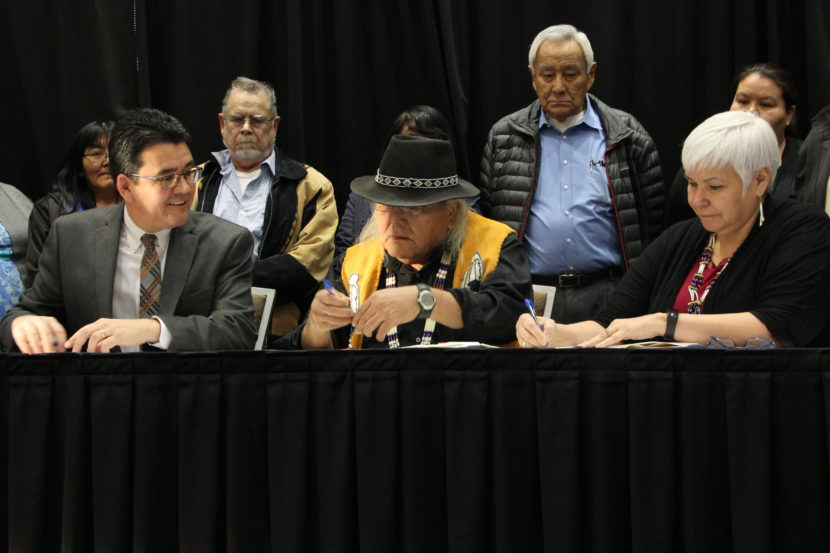
In its final days, the Obama administration is forging ahead with a promise to include Alaska Native tribes in the management of fish and wildlife on federal land.
Deputy Interior Secretary Michael Connor was in Anchorage today to announce a pilot project giving Native communities in the Ahtna region greater say in managing the subsistence hunt for moose and caribou.
The Ahtna region includes eight villages from Cantwell to Gakona to Copper Center along the Parks and Richardson Highways in Southcentral Alaska. It’s one of the most accessible hunting areas in the state, attracting hunters from up and down the Railbelt.
That has put pressure on subsistence resources, Connor said. The goal of the agreement is to try to relieve some of that pressure.
“We think over time we will develop better strategies that will allow them better access to critical subsistence resources, which has been a big issue for those communities,” Connor said.
The announcement comes a month after Interior Secretary Sally Jewell spoke to the Alaska Federation of Natives convention in Fairbanks and issued an order aimed at expanding the tribal role in managing federal lands.
The announcement was met with emotion at the Bureau of Indian Affairs conference in downtown Anchorage.
Karen Linnell is the executive director of the Ahtna Intertribal Resource Commission (AITRC), which will represent the tribes in the partnership. She choked up as she described the agreement as the culmination of 45 years’ work to gain a greater say in the management of their traditional lands.
“I just want to say thank you to the people back home for their support in getting this done,” Linnell said to a standing ovation at the Dena’ina Center. “It’s a monumentous occasion!”
Speaking afterward, she said the agreement represents incremental progress in a long fight.
“This is just a little bit closer to being more in the driver’s seat. We’re almost there,” Linnell said. “Not so much driver’s seat, but being able to sit at the table, and be on the bus, is important.”
The pilot project will allow the Ahtna Commission to manage the subsistence moose and caribou hunt on federal land for tribal members. It will also create a local advisory committee and formalize a bigger role for local communities in federal wildlife management decisions.
It’s the second such cooperative management agreement in Alaska. The first governs the harvest of king salmon on the Kuskokwim River.
Both Linnell and Connor stress the agreement will not affect access for non-Native rural subsistence and sport hunters. Gov. Bill Walker and Lieutenant Governor Byron Mallott released a statement applauding the agreement.
The push to increase collaboration with tribes has been a hallmark of the Interior Department under President Obama; it remains an open question whether the incoming Trump administration will continue the policy.
Rachel Waldholz covers energy and the environment for Alaska's Energy Desk, a collaboration between Alaska Public Media, KTOO in Juneau and KUCB in Unalaska. Before coming to Anchorage, she spent two years reporting for Raven Radio in Sitka. Rachel studied documentary production at the UC Berkeley Graduate School of Journalism, and her short film, A Confused War won several awards. Her work has appeared on Morning Edition, All Things Considered, and Marketplace, among other outlets.
rwaldholz (at) alaskapublic (dot) org | 907.550.8432 | About Rachel




